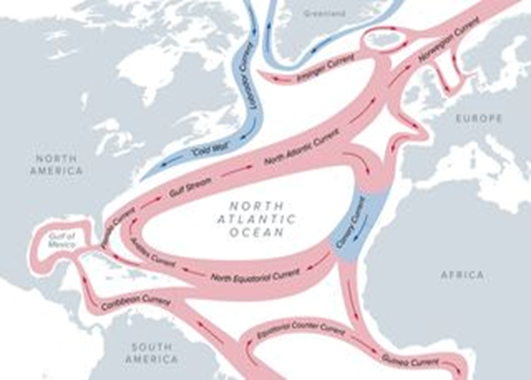And YOU’LL be alive to see it!
Maybe you saw the 2007 movie “The Day After Tomorrow”, a fantastical ride through super storms, instant ice ages, and environmental collapse. Real scientists called it “over the top” and gave it a “D minus or F” for scientific accuracy. But buried beneath the insta-glaciers was a grain of real science… our climate system is a delicate balance of world-spanning subsystems, and the collapse of any one system has major consequences for every other system. One of the most critical systems for those of us in North America and Europe is the Atlantic Meridional Overturning Circulation (Atlantic Conveyor, or AMOC). While scientists have known it was weakening for a long time, recent research shows that it is more likely than not to reach an irreversible ‘tipping’ point before 2050… and we’ll all know when it happens.
Meet the Atlantic Meridional Overturning Circulation
The Gulf Stream and the North Atlantic Drift are two well-known features that move warm water and associated weather from the Gulf of Mexico across the Atlantic towards western Europe. They’re just small parts of a bigger system, the Atlantic Meridional Overturning Circulation. In a massive oversimplification, it works like this-
The AMOC helps regulate Earth’s temperature, absorbs carbon dioxide, distributes marine nutrients, and fuels the water cycle
- As water travels north from the topics, warm water evaporates and makes the surface water saltier and denser.
- As it reaches the Arctic the water begins to cool and freeze, making the water even more salty and dense.
- This dense water sinks several thousand meters below the warmer, lighter surface water to the bottom of the Atlantic Ocean.
- From there it travels back to the tropics where it begins the long cycle again (the North Atlantic Deep Water, or NADW).
- Any given drop of water takes a thousand years to complete the full cycle.
Effects
According to the study, if the AMOC collapsed…
- Ripples throughout the world’s climate would be “so abrupt and severe that they would be near impossible to adapt to in some locations”
- Northwestern European and North American temperatures would plunge by 9 to 27 degrees (5 to 15 degrees Celsius) over the decades, threatening agriculture in Northwestern Europe
- Arctic ice would extend much farther south. After 100 years, it would extend all the way down to the southern coast of England
- The heat would rise even more in the Southern Hemisphere, changing global rainfall patterns
- cause worldwide food and water shortages.
- The Amazon rainforest would see a complete reversal in its seasons; the current dry season would become the rainy months, and vice versa.
- Collapse would trigger a southward shift in tropical monsoon systems, with catastrophic consequences for agriculture and ecosystems.
- Halted ocean currents could also further heighten sea levels along the American Atlantic coast and send marine ecosystems and fisheries into a state of “upheaval.”
- A collapse would enlarge and deepen the “cold blob” that has already developed over the eastern North Atlantic due to the slowdown of heat-carrying currents.
- A collapse and restoration of the AMOC (the Dansgaard-Oeschger event) occurred during the last Ice Age. It caused sudden warming followed by gradual cooling (10-15°C temperature changes) over periods typically lasting a few decades. This is much more significant than the changes of 1.5 degrees we’re facing now.
The state of the current
Why is the AMOC breaking down? Unsurprisingly, it’s a result of Climate Change. The slowdown of the vast system has been measured directly since 2004, with data suggests the slowdown began in the mid to late 1800’s and accelerated after 1950. The study that’s the subject of this article didn’t investigate the drivers of the breakdown; the slowing of the AMOC is a known and observed phenomenon. The study by Ditlevsen and Ditlevsen at Utrecht University looked at how fast it’s happening and when, not if, a full breakdown would occur.
For about 20 years, climate scientists have known this Atlantic Conveyor isn’t permanent. It’s “on” right now, but it can also be “off” as it was during the last Ice Age. A 2004 study showed the AMOC slowed over the past two decades to its weakest point in almost 1000 years. The current doesn’t switch slowly and smoothly from one state to the other, it hits a ‘tipping point’ then rapidly changes from one stable state to the other. The Intergovernmental Panel on Climate Change (IPCC) thought a tipping point in this century was unlikely, but Ditslevsen indicates we’ll hit the tipping point around mid-century under current conditions, see a full shutdown in a century after that.
“Until a few years ago, we were discussing whether it would happen at all, as a kind of low-probability, high-impact risk,” said oceanographer Stefan Rahmstorf. “And now it looks a lot more likely than just a few years ago that this will happen. Now people are starting to close in on when it will happen.”
Digging Deeper
Warning of a forthcoming collapse of the Atlantic meridional overturning circulation, Peter and Susanne Ditlevsen in Nature Communications, Jul 2023
Expert reaction to modelling study suggesting Atlantic Ocean circulation (AMOC) could be on course to collapse, ScienceMediaCentre, Feb 2024
Physics-based early warning signal shows that AMOC is on tipping course, Van Westen et al in ScienceAdvances, Feb 2024
Observed fingerprint of a weakening Atlantic Ocean overturning circulation, Caesar et al in Nature, Apr 2018
If the Atlantic Ocean Loses Circulation, What Happens Next? Westen et al in Scientific American, Feb 2024
A critical system of Atlantic Ocean currents could collapse as early as the 2030s, new research suggests, Angela Dewan and Angela Fritz on CNN, Aug 2024
Atlantic Ocean’s hidden conveyor belt system could shut down by 2025, Sade Agard in Interesting Engineering, Jul 2023
Key Atlantic current could collapse soon, ‘impacting the entire world for centuries to come’ leading climate scientists warn, Sascha Pare in LiveScience, Oct 2024
Ocean system that moves heat gets closer to collapse, which could cause weather chaos, study says, Seth Borenstein on AP, Feb 2024
Concern grows over Atlantic Ocean ‘conveyor belt’ shutdown, Ruairi Casey in AlJazeera, Nov 2021
Atlantic Ocean Conveyor Likely to Collapse Before 2050, Say Climate Scientists, Physics arXiv Blog on Discover Magazine, Aug 2024
A crucial system of ocean currents is heading for a collapse that ‘would affect every person on the planet’, Laura Paddison on CNN, Jul 2023
Special Report: Special Report on the Ocean and Cryosphere in a Changing Climate- Summary for Policymakers, IPCC Report, 2019













